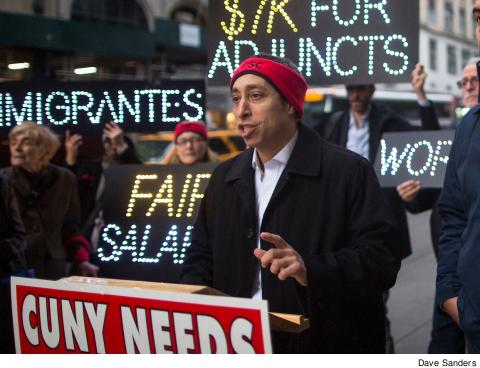 |
The attempt by the state’s Democratic Party to get rid of New York State’s fusion voting system is an act of political vengeance by self-interested politicians with little interest in accountability or political principle.
Fusion voting allows parties to cross-endorse candidates from other parties. Historically, this has meant that smaller parties (the American Labor Party, the Liberal Party, the Conservative Party, Working Families Party, the Rent Is Too Damn High Party, etc.) can put up a candidate for office on a ballot line who is also put up for office by one of the two major parties. In order to retain a ballot line for four years, the smaller party has to get at least 50,000 votes for their candidate on their ballot line. Smaller parties sometimes put up their own candidates and reach that threshold, but not all do.
POLITICAL TARGETS
Fusion is one way, therefore, to retain a party’s place in the political life of the state, take some fewer risks, but also push a candidate toward their political positions – usually somewhere close but not identical to the major party’s consensus positions – as a pressure group under his watch. Candidates from major parties can benefit from fusion particularly when the minor party has strong party loyalty among its members or when it has a successful ground operation that can turn out voters on Election Day.
Rudy Giuliani might not have won his first successful bid for mayor without the Liberal Party’s backing in 1993. A different kind of Republican, Fiorello La Guardia, won the mayor’s race in 1934 on a fusion ticket.
Last week – by most accounts, with Governor Andrew Cuomo’s blessing and even urging – the State Democratic Committee voted to end fusion voting in New York State. This is not likely to happen, given dissention in the ranks of the party and the requirement that it pass the state legislature. But it is clearly intended as a shot across the bow to the Working Families Party, whose endorsement in the Democratic gubernatorial primary of Cynthia Nixon – who challenged Cuomo from the left – incurred the governor’s wrath.
As a party with roots in the union movement and organizations based in working-class communities of color in New York City and its surrounding suburbs, the Working Families Party focuses on electing Democrats whose platform is consistent with reducing urban inequality and exploitation, from repealing draconian drug laws to labor protections. More moderate Democrats from rural and more affluent areas have not warmed to the Working Families’ platform.
Yet, as PSC Graduate Center Chapter Chair Luke Elliott-Negri says, the reason that the Working Families Party endorses Democrats is that people running as progressive or even left Democrats have politics consistent with the WFP’s, and there is no reason for the WFP to find other candidates who might split the vote and end in losing the election for progressive forces. They help “Democrats be Democrats” and distinguish themselves from Republicans.
ACCOUNTABILITY
Opponents argue the meddling of one party in another’s affairs is anathema, but they also point to the idea that minor parties can get plum patronage appointments from successful candidates whose victories they help. Nobody really charges the Working Families Party with this, but opponents recall the Liberal Party’s turn toward patronage, including deeply corrupt and nepotistic jobs for the party boss’s family. And because minor parties can pull major ones toward ideological extremes, opponents of fusion voting blame them for political polarization.
The fusion system actually means that the internal party dynamics of both major parties are held accountable to people not tied to the party by loyalty – or patronage. Fusion voting was initially a way to fight machine politics, since machines were, and still are, rooted in a favors system based on political parties. The attack on fusion voting is an attack on political accountability: for example, the Independent Democratic Conference that blocked progressive legislation in the State Senate for years was shown the door by vigorous Working Families Party-backed challengers. An attack on fusion is, therefore, an attack on precisely those politics that have held back much more popular demands for equality – including funding CUNY – for years.
John Krinsky is an associate professor of political science at City College.

